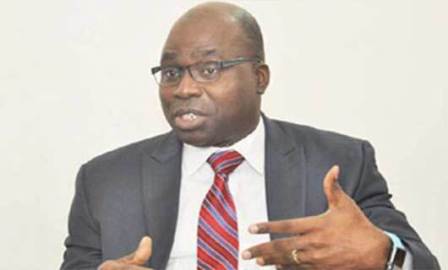The Chairman of ICPC, Prof Bolaji Owasanoye, disclosed this in Abuja on Tuesday at the 3rd National Summit on Dimishining Corruption in the Public Service.
The News Agency of Nigeria (NAN) reports that the summit has the theme: Corruption and the Cost of Governance: New Imperatives For Fiscal Transparency.
He said the money was discovered through the agency’s projects tracking initiative, designed to ensure accountability and transparency in the conception, execution and management of public-funded projects.
The ICPC chairman, however, said that the anomaly was rectified when the commission drew the attention of the Minister of Finance.
On the tracking of constituency projects, he said under the third phase of the exercise, 1083 projects across the entire country were recorded with exception of Borno and Zamfara due to security challenges.
He said the exercise verified the implementation of executive and zip projects of legislators.
“We have so far initiated enforcement actions against 67 contractors and forced them back to site and ensured completion of 966 projects worth N310 billion, some of which were hitherto abandoned.
“Our findings indicate that the same malady of corruption afflicts executive as well as zip projects thus undermining government projections, escalating the cost of governance and denying Nigeria value for money.
“These maladies include poor needs assessment that disconnects projects from beneficiaries; false certification of uncompleted contracts as completed.
“Also, deliberate underperformance of contracts, incessant criminal diversion and conversion of public property by civil servants.
“Other challenges relate to duplication of projects in the budget.
“ICPC review discovered that 257 projects amounting to N20.138 billion were duplicated in the 2021 budget leading us to submit an advisory to the Minister of Finance which was promptly actioned by the Minister to prevent abuse, ” he said.
The ICPC boss further explained that the agency investigated some cases of illegal recruitment forwarded to it by the Head of the Civil Service of the Federation.
He added that the outcome of the investigation has far implicated the Ministry of Labour and the University College Hospital Ibadan and a number of corrupt staff of other MDAs at a lower level.
“At another level, a syndicate of corrupt individuals within the service corruptly employ unsuspecting Nigerians, issue them fake letters of employment, fraudulently enroll them on IPPIS.
“Such innocent Nigerians were equally posted to MDAs to commence work.
“ICPC is prosecuting one of the leaders of the syndicate from whose custody we retrieved several fake letters of recommendation purportedly signed by Chief of Staff to the President, Hon. Ministers, Federal Civil Service Commission and other high-ranking Nigerians.
“This abuse of power is consummated with the complicity of compromised elements in IPPIS. These cases are currently under investigation, ” he added.
Owasanoye, however, advised the government to invest more in prevention and behaviour change strategies alongside law and order measures to fight corruption.
This, according to him, is important if we are to maximize the gains of prevention and the wisdom that “prevention is better than cure”.
“ICPC in collaboration with development partners notably, Ford Foundation for Illicit Financial Flows (IFFs) and MacArthur Foundation for behaviour change is putting more attention to these areas in the months ahead.”
The Secretary to the Government of the Federation, Boss Mustapha said that recent data from the Budget Office indicated that “actual MDAs recurrent spending was still on the rise”.
He added that from N3.61 trillion in 2015, it has risen to N5.26 trillion in 2018 and N7.91 trillion in 2020.
“Government is highly worried that about 60 percent of Federal Government’s Overhead Expenditure in three years (2012 to 2014) was spent on travels, maintenance, local and international training, welfare, office stationery, consumables, honoraria.
“This summit is meant to appropriately re-focus all arms of government and their agencies on the need for more openness in the use of financial resources to purposes for which they are meant, to reduce the cost of governance.”
Senate President, Ahmad Lawan, said corrupt practices and other vices have weakened public institutions and agencies of government.
Lawan, who was represented by Sen. Michael Nnachi, said that diminishing corruption in the public sector was crucial to the delivery of government programmes and services to meet the 2030 Sustainable Development Goals (SDGs).
The Senate President assured that the National Assembly would continue to take measures and pass laws that would strengthen the fight against corruption and limit illicit financial flows.
Highlight of the event was the presentation of Public Service Integrity Awards to three outstanding Nigerians by President Muhammadu Buhari. (NAN)
©Copyright MOTORING WORLD INTERNATIONAL.
All rights reserved. Materials, photographs, illustrations and other digital content on this website, may not be reproduced, published, broadcast, rewritten or redistributed in whole or in part without prior written permission from Motoring World International
Contact: [email protected]




